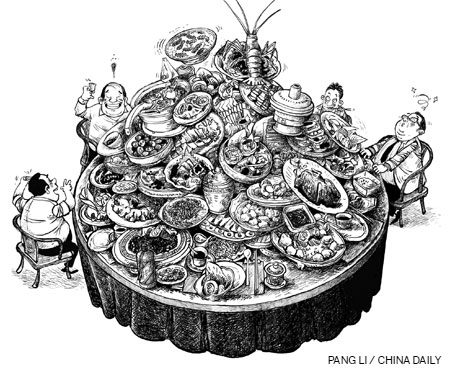Nibbling away at food waste
Updated: 2013-02-02 08:27
By Raymond Zhou (China Daily)
|
||||||||


The Chinese penchant for purchasing more food than necessary, especially in restaurants, is linked to our obsession with image. It can't be easily abolished but should be chipped away a block at a time to give way to common sense.
Every Chinese student is taught this Tang Dynasty poem:
Farmers weeding at noon, sweat down the field soon. Who knows food on a tray, thanks to their toiling day.
In the Chinese original, the word "food" receives emphasis, literally meaning: "every grain on the plate is an embodiment of hard work".
Chinese parents would use this to teach their children not to waste food because it is the product of farmers' exhausting labor under the scorching sun or in rainstorms.
Yet, when they dine out, they'll be astounded by the amount of food squandered. Of course, food in the poem refers to grains, the staple in the Chinese diet as people in subsistence hardly had access to meat and other high-protein items. But, nowadays, the food that's thrown away is mostly the expensive dishes.
Take a pricy fish that was not touched at all by the restaurant customer. When the waiter was asked by a television reporter how he felt about it, he replied: "What can I do? This dish would cost me a month's salary."
By one estimate, there is so much food wasted in China that it can feed 200 million people.
The No 1 culprit, as I see it, is the face issue - the traditional Chinese notion that one should order more than necessary simply to show one's hospitality.
Make that much more.
Depending on the guests, it could be one third more to three times more than necessary. The more distinguished the guests, the more food the host will order.
If every dish is finished by the end of a meal, the host will not be complimented for being smart.
Instead, the host may receive behind-the-back sneer that he or she was being too stingy - an accusation that any conformity-minded Chinese would take pains to avoid.
On occasions such as Lunar New Year's Eve dinner, it is customary to leave portions unfinished as an auspicious sign that the coming year will bring in more abundance.
From my personal experience, the most egregious food prodigality in China comes from government and corporate expense accounts.
When these people throw a banquet, you'd better forget about that Tang poem, or you'll be squirming in agony.
My rough estimate is, the food is usually enough to feed three times the number of participants.
For example, some of the high-end feasts divide up each course, a la Western dinner, but there are usually 15-16 courses.
Compare it to a Western dinner, which has appetizer, soup or salad, main entree, cake and drink - all together five items, including the less filling appetizer and drink.
However, the 15-course Chinese dinner is mostly main entrees. I usually skip Courses 9 through 14 to spare my stomach from testing its capacity. I pray the kitchen staff would notice I didn't touch them at all and therefore would feel comfortable eating them or taking them home.
That's why I don't believe adopting the Western way of eating will solve the Chinese quandary. It's the number of courses we take as our face-saving prerequisite that is to blame.
Some have suggested restaurants selling half portions so that patrons may order more dishes but still avoid over-ordering.
But a half portion would not come at half price, because the labor cost is essentially the same. Besides, with inflation inching up all these years, most eateries are shrinking the size of portions anyway - usually as a prelude to raising prices, which will incur the cumbersome task of reprinting the menu.
I agree that with a couple of friends eating out, smaller portions may serve well to cut down waste. But long term, people will adjust their habit and simply order more dishes.
There is no way a government proclamation or a mass movement will change the national proclivity of over-ordering, which is deeply rooted in our culture.
If the current campaign can reduce over-ordering from three times to one third, I would consider it an unqualified success.
Of all the solutions that are being bandied about, taking home the leftovers seems the most feasible.
If I'm not mistaken, this practice was imported from Western countries like the US in the early 1980s.
Before then, an ordinary Chinese person did not have many chances of gorging in a restaurant.
I remember clearly when I was a graduate student in Guangzhou's Sun Yat-sen University and an overseas Chinese scholar was taken to the campus diner. He asked for a doggy bag, which blew us away.
Americans are supposed to be so much richer than us, we thought, and even we would not think of such a face-losing thing as taking home what's left on the table.
The restaurant did not have doggy bags. They could use only plastic bags. Even now, some restaurants still use plastic bags, which seems very unsightly and is prone to making a mess on your way back.
At least, the practice is gaining more acceptance in China.
The problem remains, if it's a family gathering or dinner with close friends, one tends to be less self-conscious about it. But if it's someone you want to impress, you'd not want to lose points by saving what's left of the food. (You've spent so much on it anyway.)
And if you're the guest, you're not really in a position to say: "Can't I take this Moo Shu pork home?"
So, it will not make a dent to the most lavish and wasteful of banquets.
In this sense, the new leadership has already taken the right action by pressuring government agencies to cancel unnecessary dinner functions. As China is a top-down society, this is more effective than broadcasting slogans on television.
Speaking of doggy bags, I'm reminded of how little food is wasted in American restaurants. But I'm not saying Americans do not throw away perfectly good food. They do - and in mind-boggling amounts.
The food waste in the United States that I've witnessed happens in the home kitchen.
Obviously, the Tang poem does not apply to the American way of producing foodstuffs, which is highly efficient and rarely incurs backbreaking physical labor.
The affordability of food together with the large packaging leads to over-buying.
This is exacerbated by the conservative expiration date suggested by the producers, which means, trunks of groceries are purchased and stored in oversized refrigerators, and much of them end up in garbage bags.
A relative of mine in Houston uses an industrial-size garbage can in her kitchen. At the end of each day, it's full and must be disposed of.
Fortunately, Chinese home kitchens are still a place of relative frugality.
Our parents have tasted hunger and know how blessed we are to be living in an age of fecundity.
But the younger generation may not have an acute sense of moderate consumption. For them, finishing up the plate is the quaint idea from an ancient poem.
Pretty soon, we'll live like Americans and purchase food in bulk and dispense an increasing share to the garbage dump.
The campaign to finish up one's plate, or "guangpan" in catchy slang, is not meant to stymie consumption. Nor will it coerce people to eat more than they need and thus put on weight. It is not even a throwback to the old era when one "ate bitter" (chiku) for one meal a year to remind oneself of the hardship of the previous age.
It is simply to drill some common sense into a vanity-conscious society that food is meant for your mouth and too much of it will not make you an important person.
Contact the writer at raymondzhou@chinadaily.com.cn.

 'Taken 2' grabs movie box office crown
'Taken 2' grabs movie box office crown
 Rihanna's 'Diamonds' tops UK pop chart
Rihanna's 'Diamonds' tops UK pop chart
 Fans get look at vintage Rolling Stones
Fans get look at vintage Rolling Stones
 Celebrities attend Power of Women event
Celebrities attend Power of Women event
 Ang Lee breaks 'every rule' to make unlikely new Life of Pi film
Ang Lee breaks 'every rule' to make unlikely new Life of Pi film
 Rihanna almost thrown out of nightclub
Rihanna almost thrown out of nightclub
 'Dark Knight' wins weekend box office
'Dark Knight' wins weekend box office
 'Total Recall' stars gather in Beverly Hills
'Total Recall' stars gather in Beverly Hills
Most Viewed
Editor's Picks

|

|

|

|

|

|
Today's Top News
Boston bombing suspect reported cornered on boat
7.0-magnitude quake hits Sichuan
Cross-talk artist helps to spread the word
'Green' awareness levels drop in Beijing
Palace Museum spruces up
First couple on Time's list of most influential
H7N9 flu transmission studied
Trading channels 'need to broaden'
US Weekly

|

|







